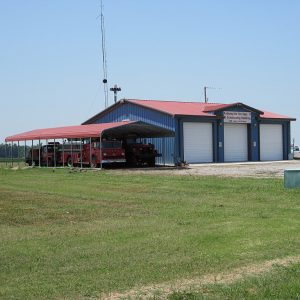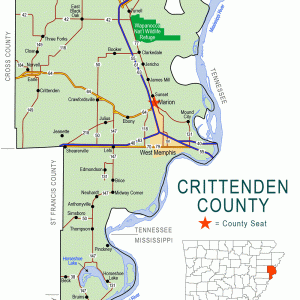calsfoundation@cals.org
Anthonyville (Crittenden County)
| Latitude and Longitude: | 35°02’22″N 090°20’27″W |
| Elevation: | 207 feet |
| Area: | 0.08 square miles (2020 Census) |
| Population: | 135 (2020 Census) |
| Incorporation Date: | December 15, 1999 |
Historical Population as per the U.S. Census:
|
1810 |
1820 |
1830 |
1840 |
1850 |
1860 |
1870 |
1880 |
1890 |
1900 |
|
– |
– |
– |
– |
– |
– |
– |
– |
– |
– |
|
1910 |
1920 |
1930 |
1940 |
1950 |
1960 |
1970 |
1980 |
1990 |
2000 |
|
– |
– |
– |
– |
– |
– |
– |
– |
– |
250 |
|
2010 |
2020 |
|
|
|
|
|
|
|
|
|
161 |
135 |
|
|
|
|
|
|
|
|
Anthonyville is a town located on State Highway 147 in southern Crittenden County. The town has never had a post office, a school, or a railroad depot; it exists largely as a bedroom community for the greater Memphis, Tennessee, area. The population is largely African-American.
The rich soil of Crittenden County, replenished by Mississippi River flooding, has long drawn people to the area. Ancient artifacts have been unearthed in the county as reminders of its long history of human habitation. Both Spain and France held ownership of the land for a time, and some Spanish settlers had already established plantations in the county before the Louisiana Purchase in 1803 made the land part of the United States. Afterward, American settlers began entering the region, also creating plantations to grow cotton and various food crops. These plantations generally had large numbers of African-American slaves.
After the Civil War, many of the former slaves remained as tenant farmers, doing much the same work they had done before the war. Railroads and growing industry gave new opportunities to many workers in Arkansas, and some Crittenden County residents migrated to the new city of West Memphis (Crittenden County) in the late nineteenth century. The southern end of the county, however, remained strongly agricultural. World War I inflated cotton prices for several years, offering hope of a better life for tenant farmers, some of whom attempted to organize in order to negotiate more effectively with the landowners. Landowners resisted change, however, and the price of cotton was dramatically reduced during the 1920s.
In 1939, Luke Sears Anthony Sr. and his son Mascaline (M. L.) Anthony began planning to start a funeral business for their fellow African Americans in southern Crittenden County. To raise money for the venture, M. L. Anthony enlisted in the U.S. Navy and served for eight years, sending his pay to his father.
Meanwhile, the United States entered World War II after the bombing of Pearl Harbor, and, by 1943, prisoners of war (POWs) from Italy and Germany were being shipped to the United States for detention until the end of the war. One of the branch camps of POWs was built in southern Crittenden County between Neuhardt and Horseshoe Lake. POWs worked in the cotton fields and took on other tasks to replace the American men who were fighting overseas. When the war ended and the prisoners returned to Europe, the U.S. government auctioned off the land that had been used for the POW camp.
On land owned by the Anthony family, Luke Anthony used money provided by his son to open the Anthony Funeral Home in 1946 along what was then U.S. Highway 79. The business had a Neuhardt address.
Other lots were also purchased by Black residents, who built up the small community west of the highway. When M. L. Anthony returned home from the navy in 1948, he joined his father in the business, but he left for Chicago, Illinois, the next year, leaving other family members in charge. Eventually, leadership of the enterprise was left to Solon Anthony and his wife, Eleanor. While running the business, Solon also pursued a degree in elementary education from Mississippi Industrial College. With this degree, he found work in the public school system of Hughes (St. Francis County), where Eleanor also taught. Solon Anthony eventually became a school principal in Hughes. Meanwhile, the funeral business expanded, with two funeral homes in West Memphis along with the original rural location along the highway.
The small settlement, which appears as “Andy Subdivision” on one map from the late twentieth century, decided to incorporate as a town in 1999. This gave the residents of Anthonyville the opportunity to collect taxes from residents and receive matching funds from state and federal government agencies in order to provide services and make improvements, such as paved roads. The town is named for Solon Anthony and his relatives. Anthonyville has a volunteer fire department and is home to Bright Star Missionary Baptist Church.
Two major tornadoes, both measured as F3 in force, struck near Anthonyville, one on April 19, 1970, and another on December 14, 1987.
For additional information:
“History.” Anthony Funeral Home, Inc. http://www.anthonyfuneralhome.net/fh/aboutus/history.cfm?&fh_id=10896 (accessed November 21, 2025).
Woolfolk, Margaret Elizabeth. A History of Crittenden County, Arkansas. Greenville, SC: Southern Historical Press, 1993.
Steven Teske
Butler Center for Arkansas Studies






Luke Anthony’s father, Rev. Dan Anthony, and wife Betty Anthony bought the land that makes up Anthonyville on installments from a cotton merchant in Memphis, Tennessee, by the name of Raynall Cornell for an unknown amount in the early 1900s. That land was passed down to Luke Sr., who later passed it down to his children, Luke Jr., Leo, Calvin, M. L. Frederick Douglas, and Solon. Luke and his sons in particular worked a successful farm, including the sale of cotton. Later on, Anthony Funeral Home opened its doors in 1946 along what was then U.S. Highway 79, formerly Neuhardt.